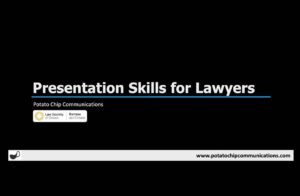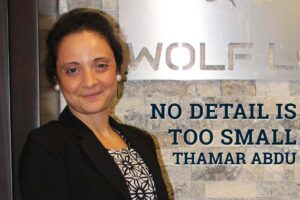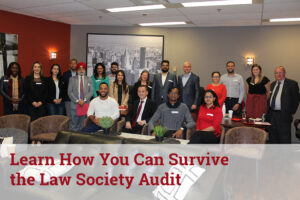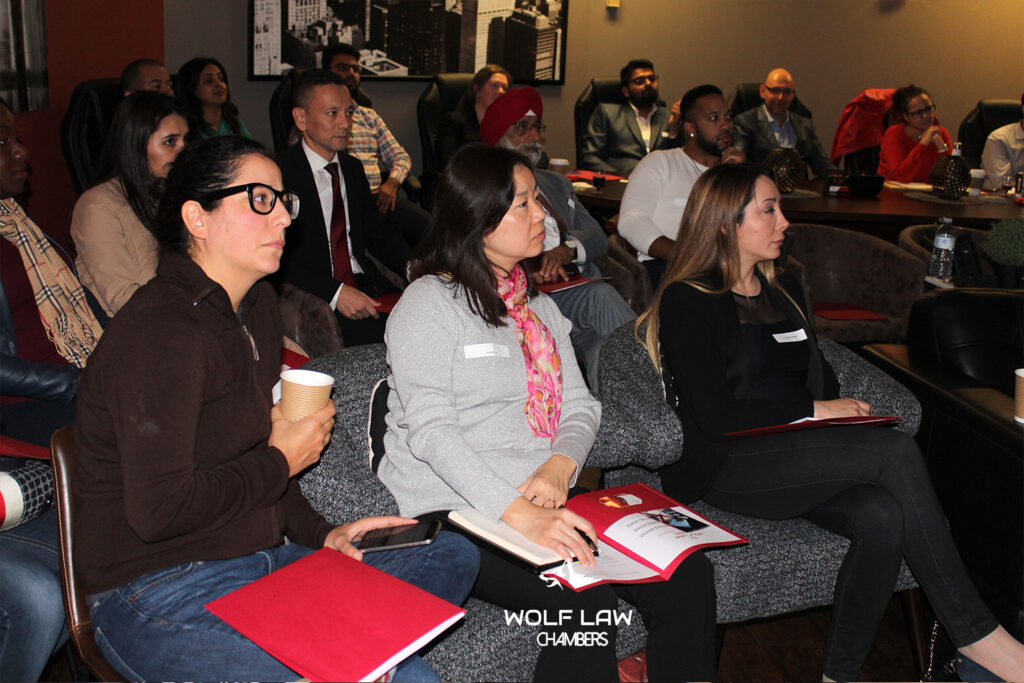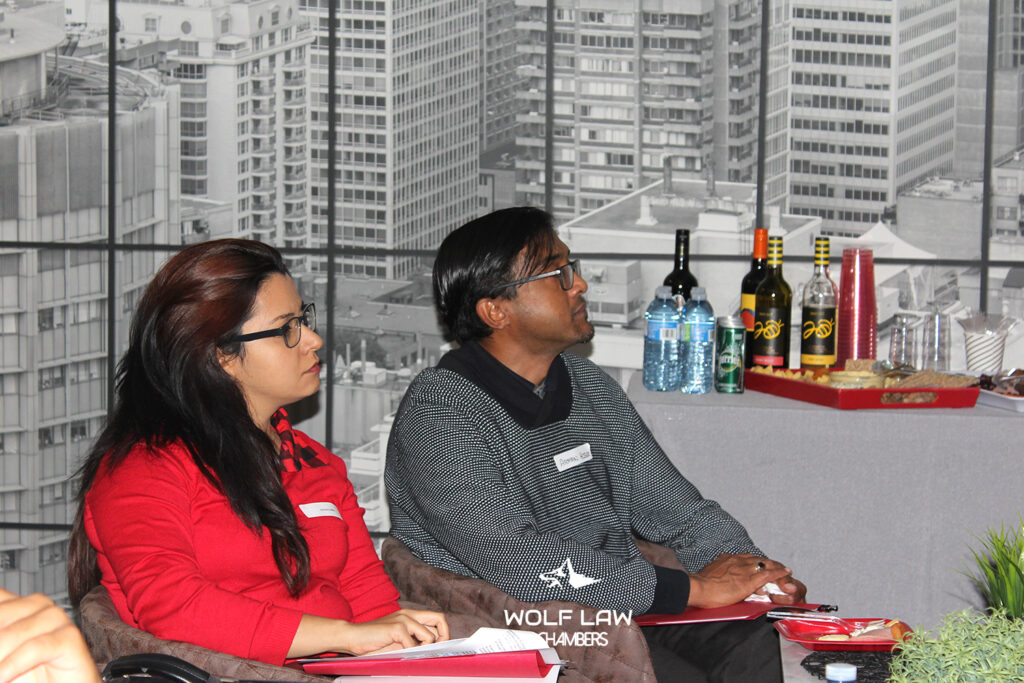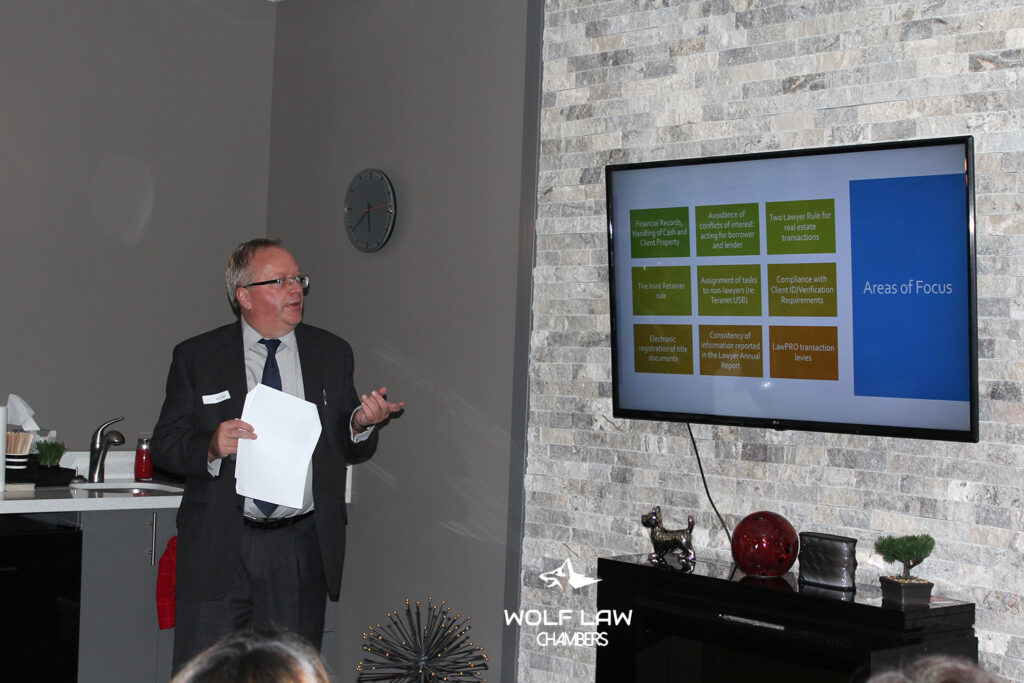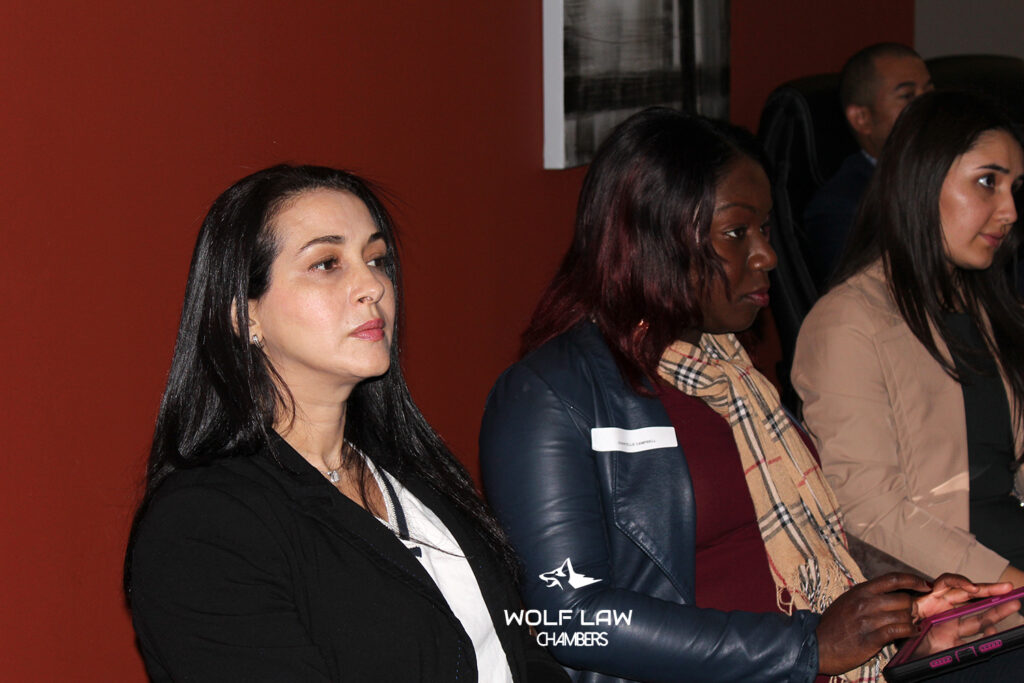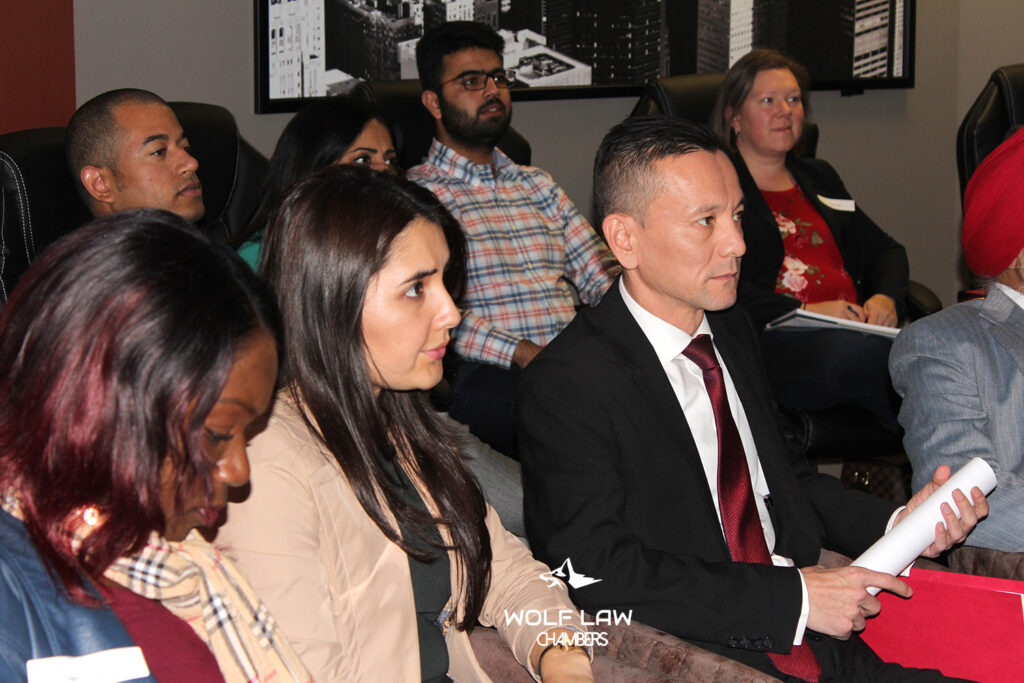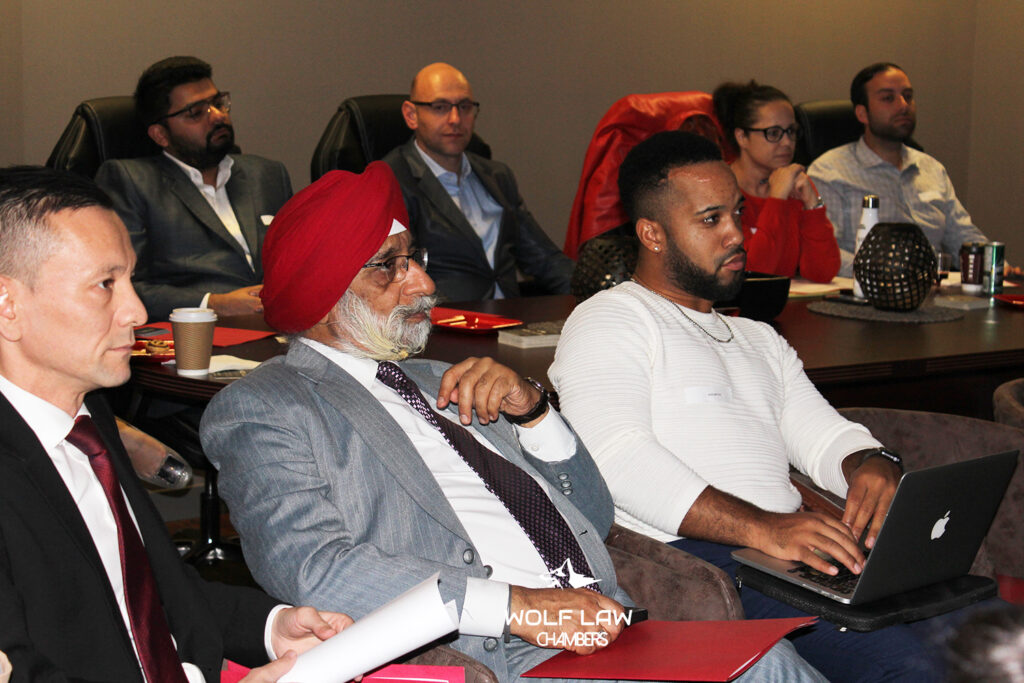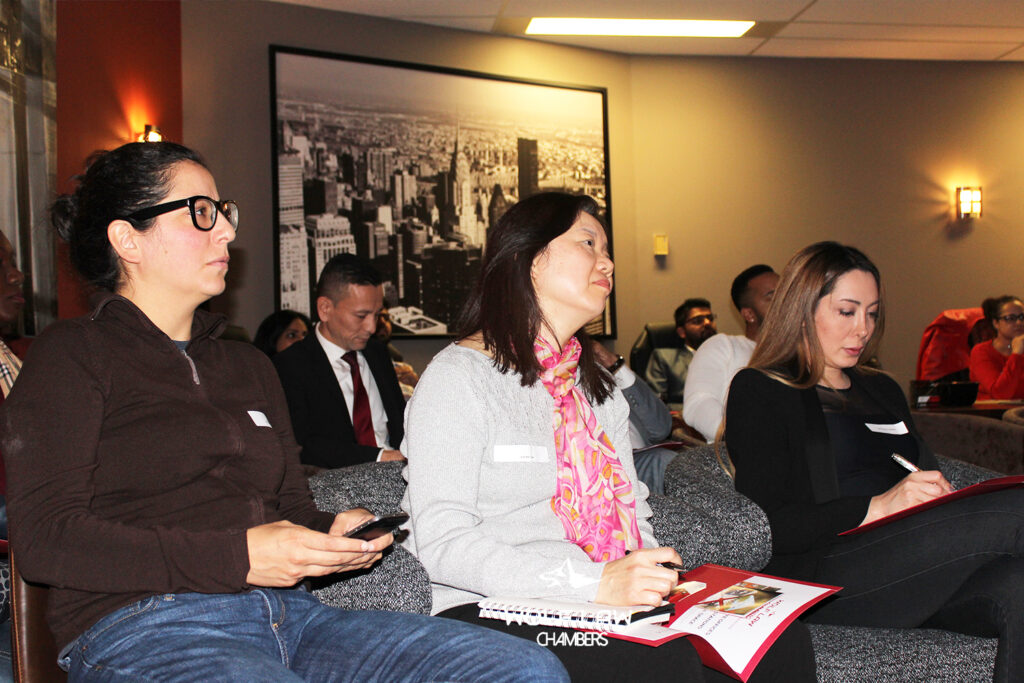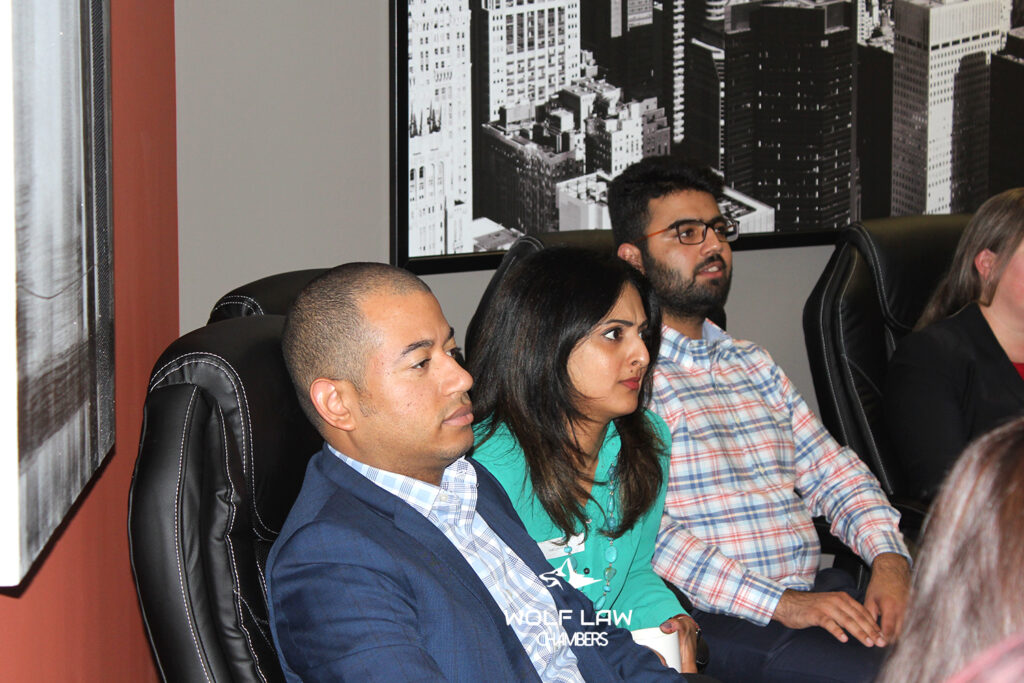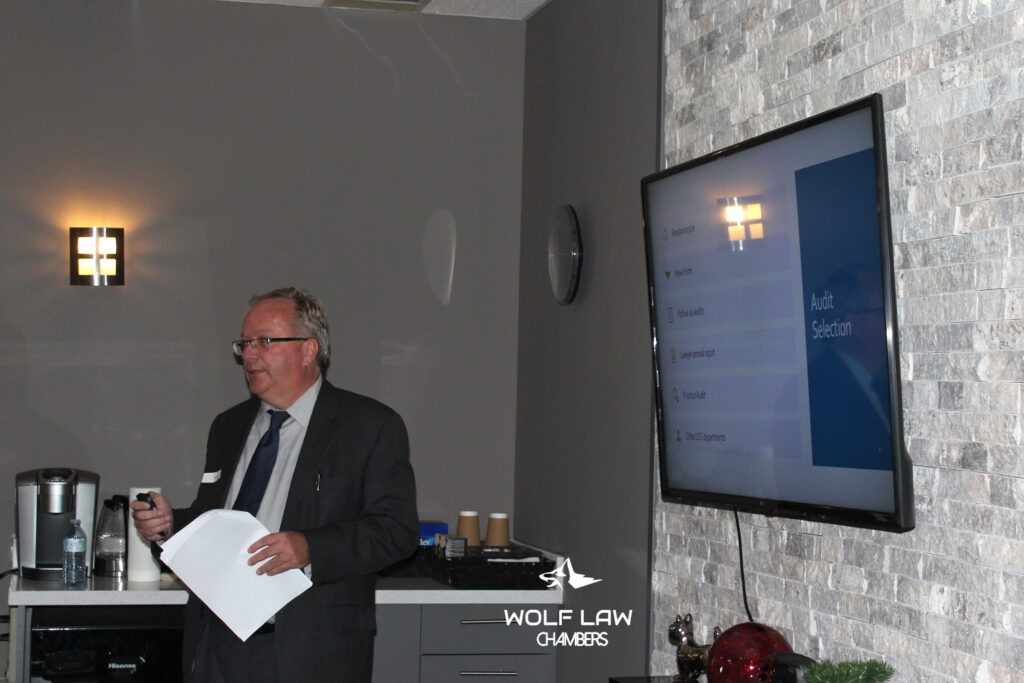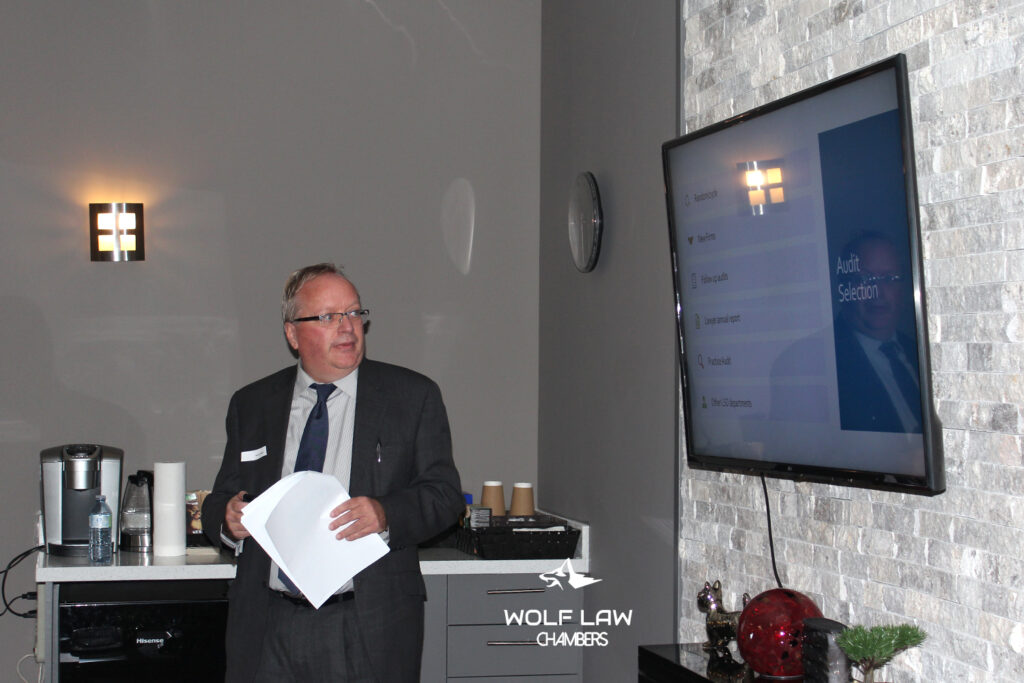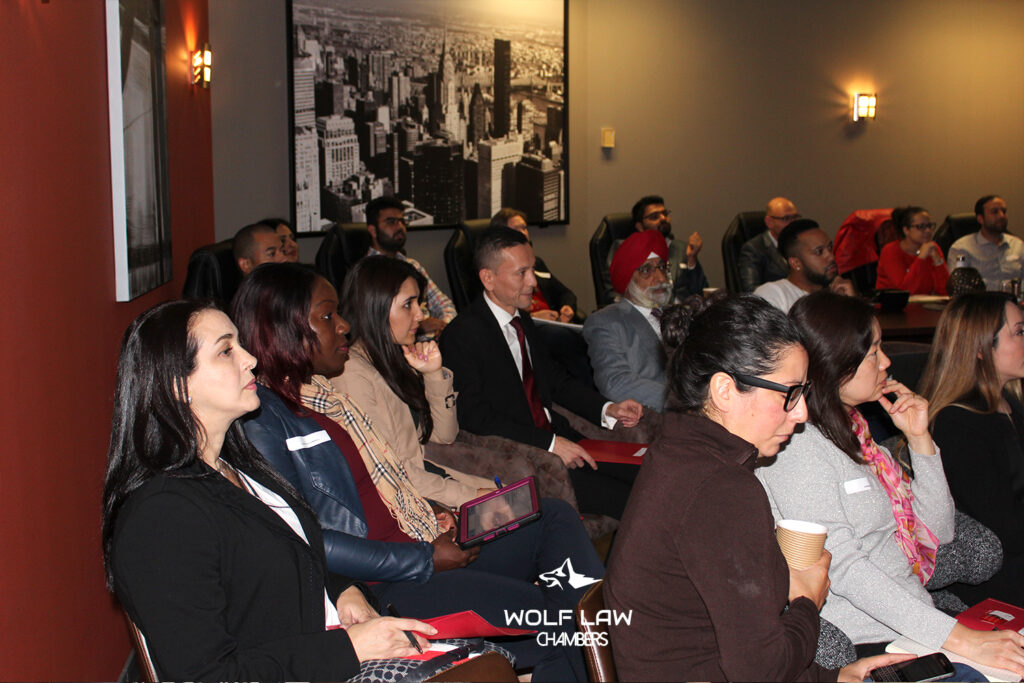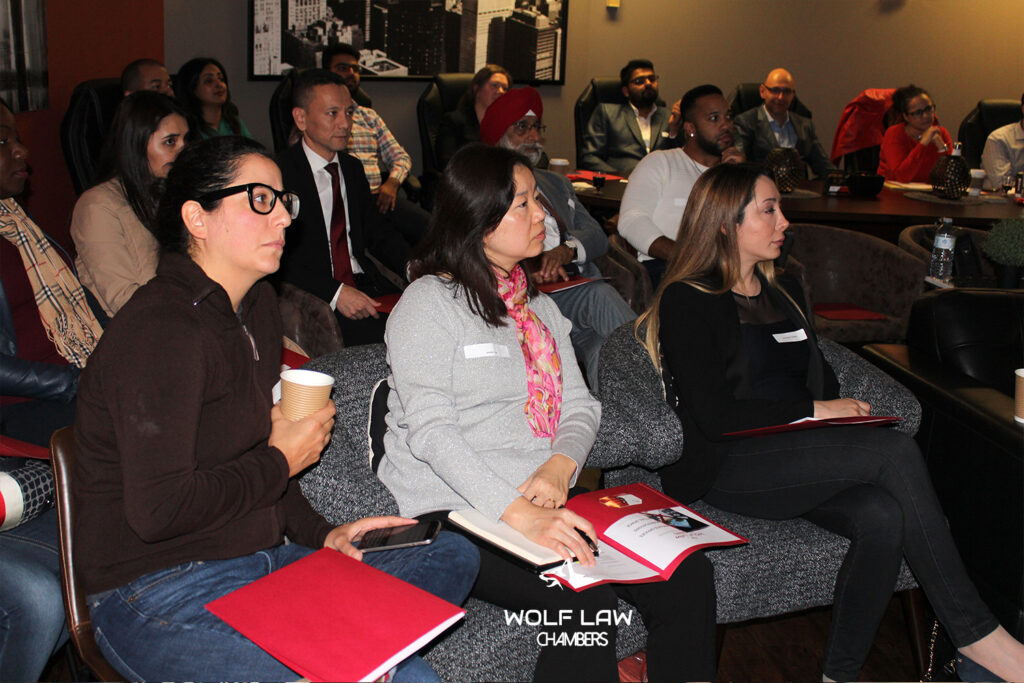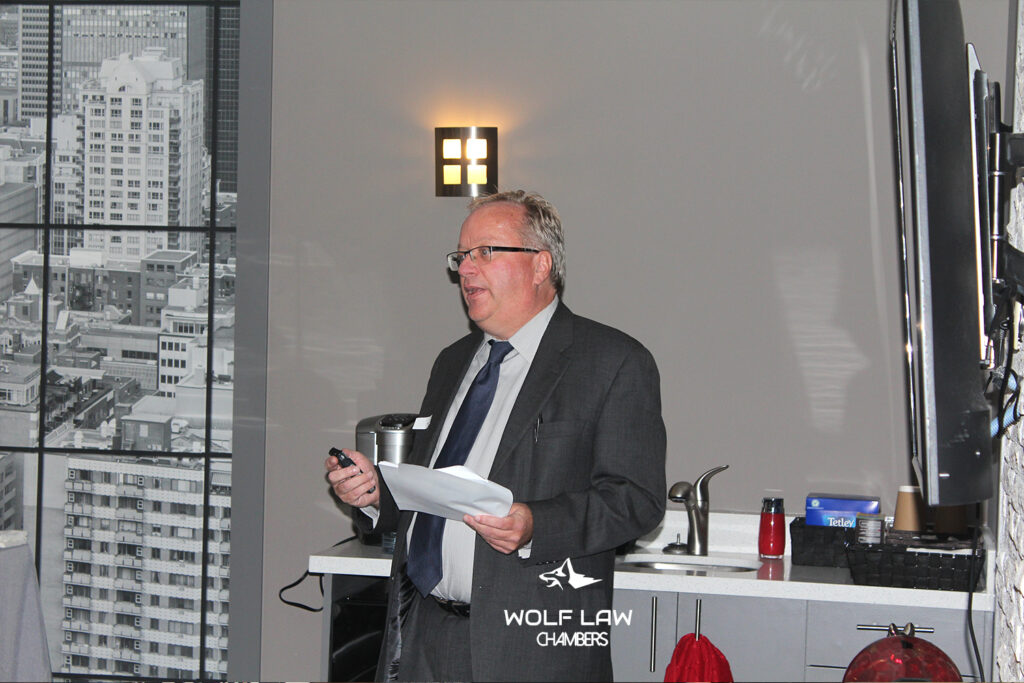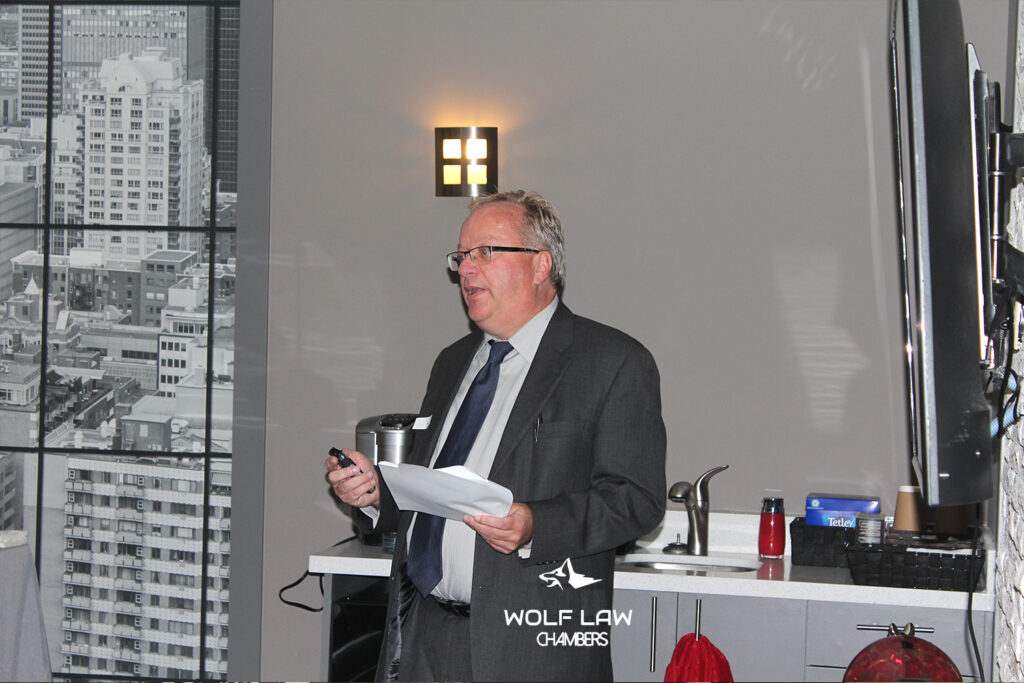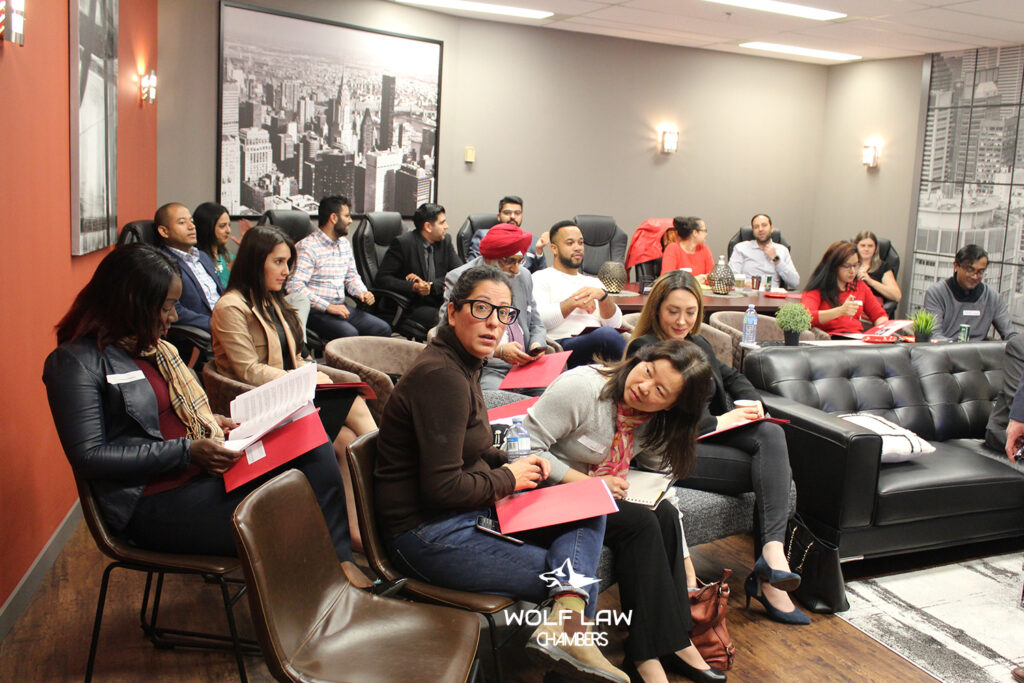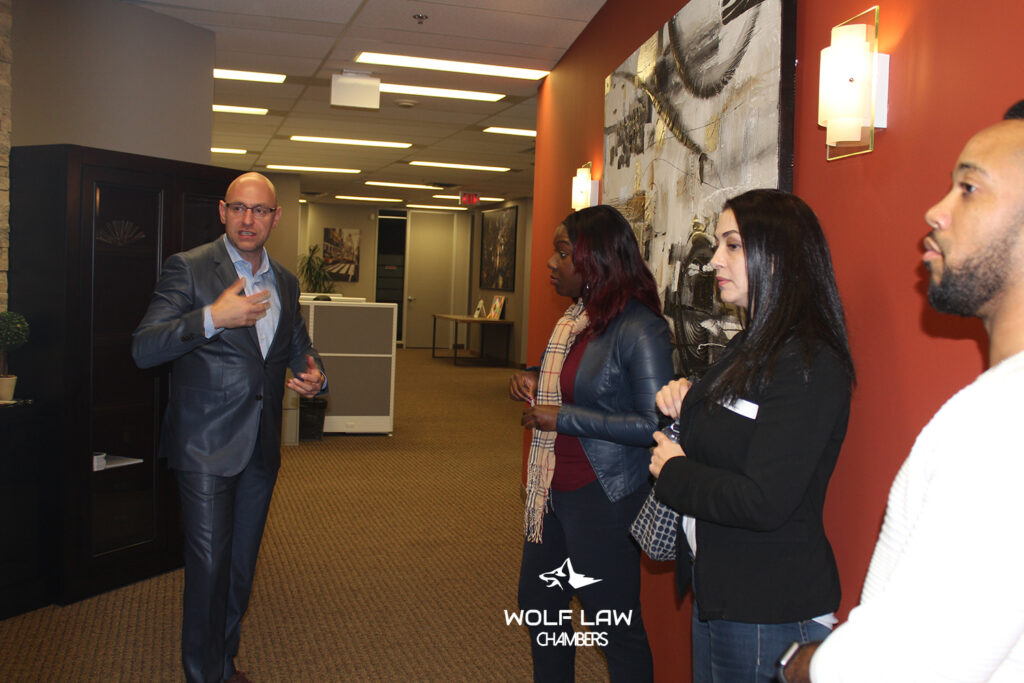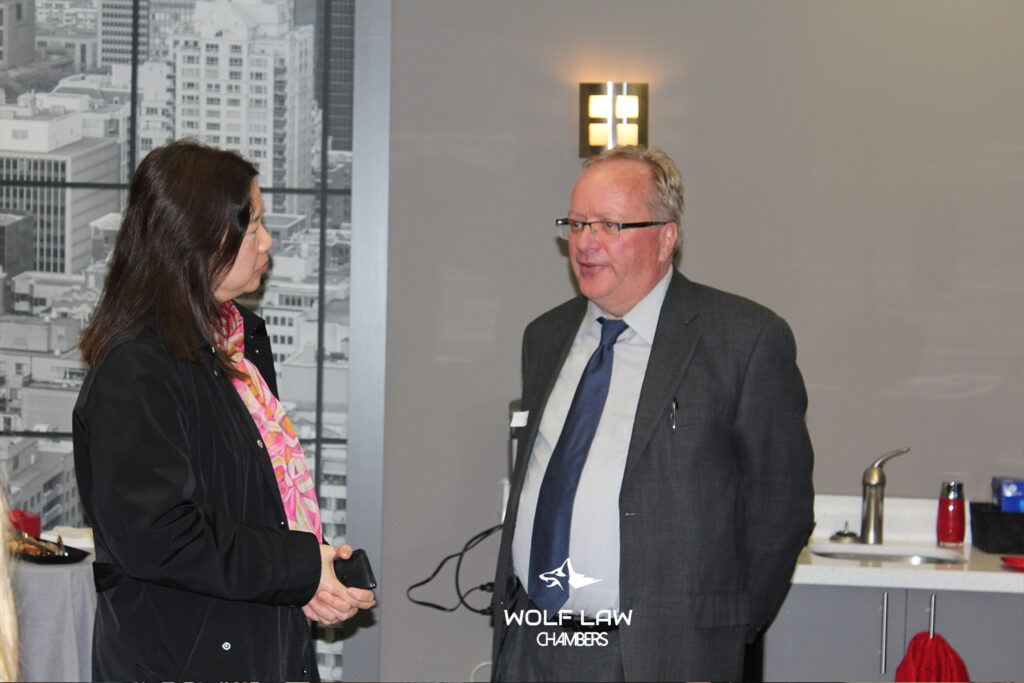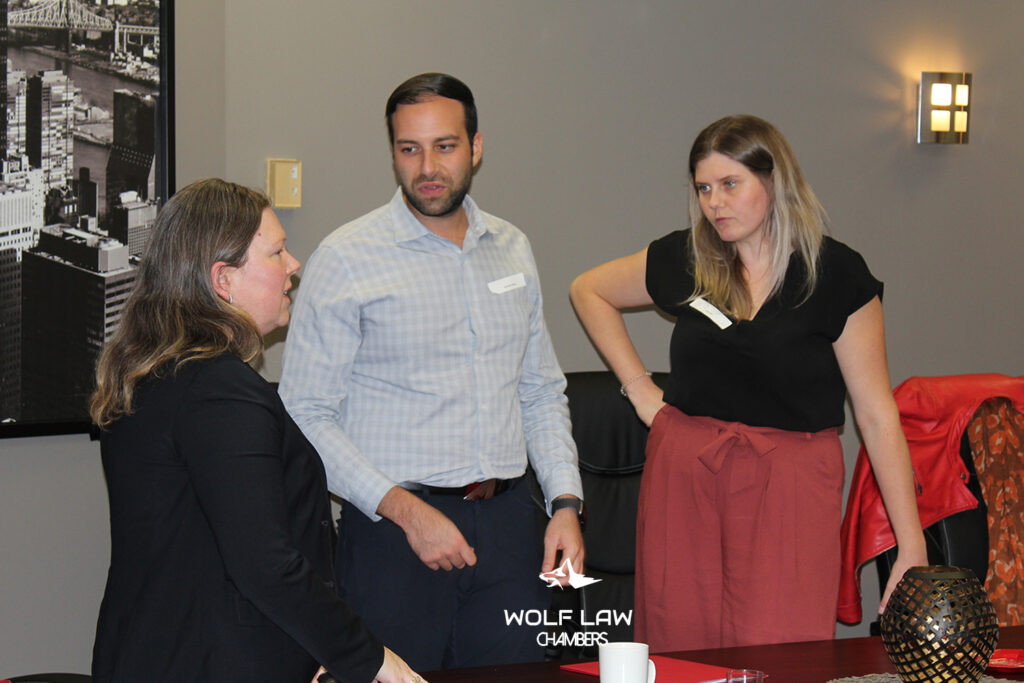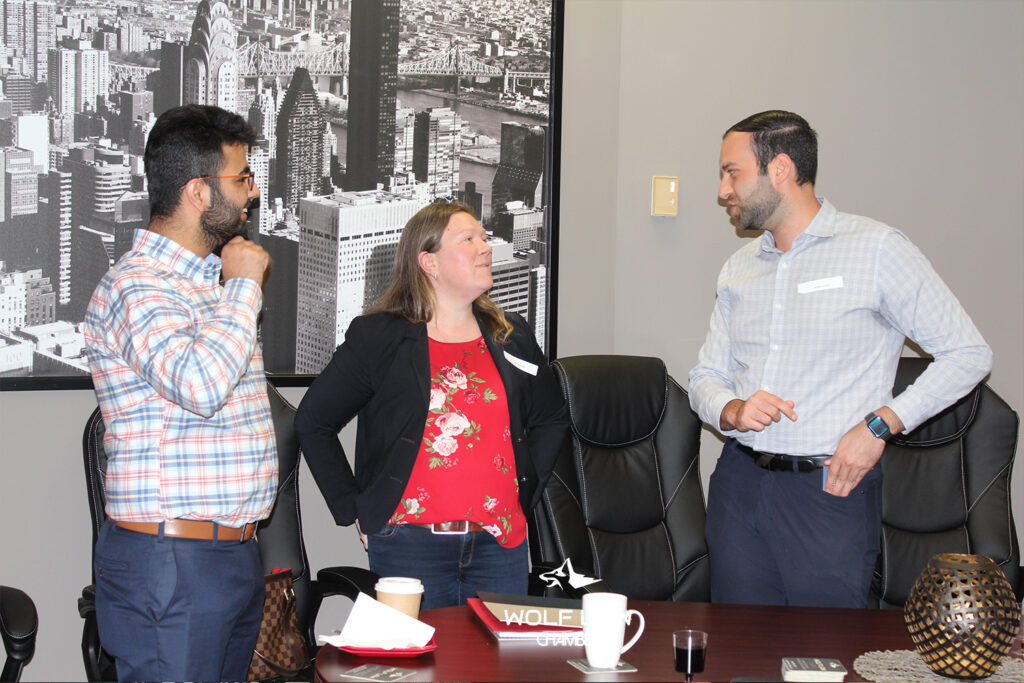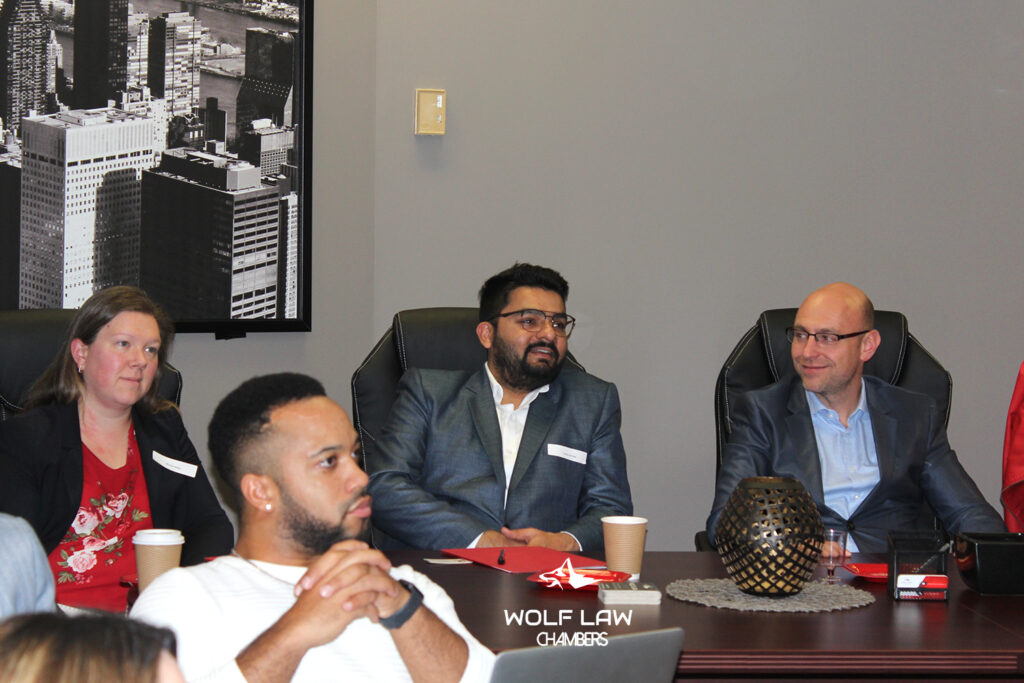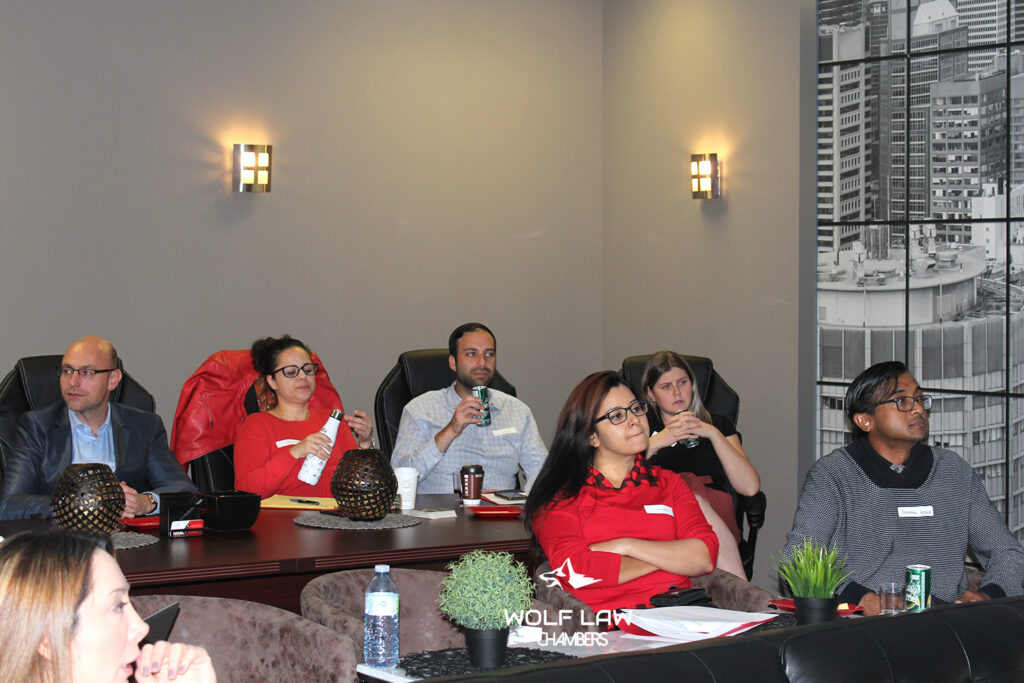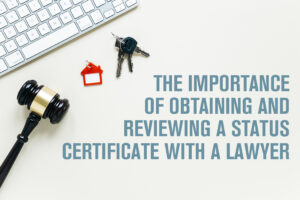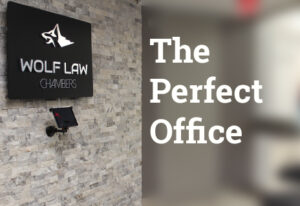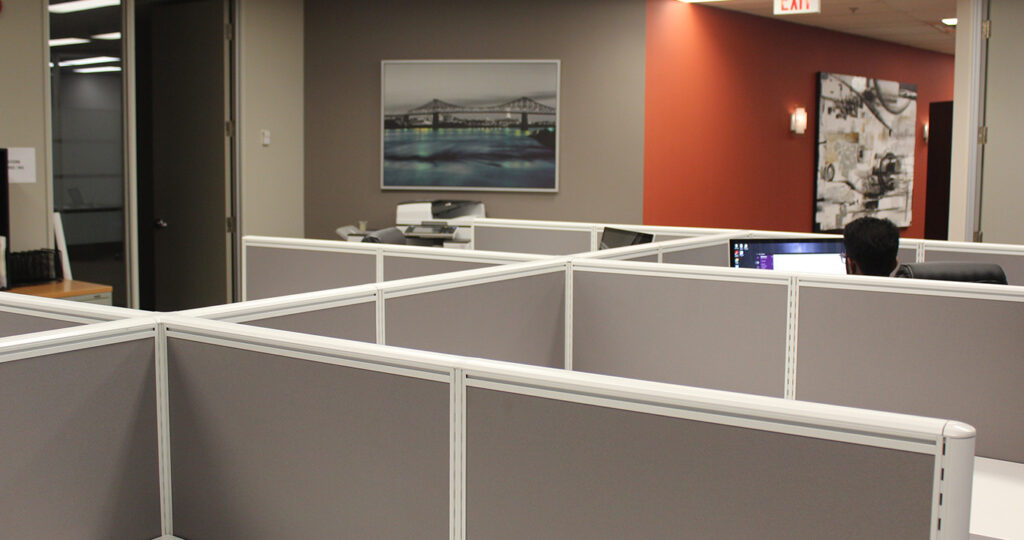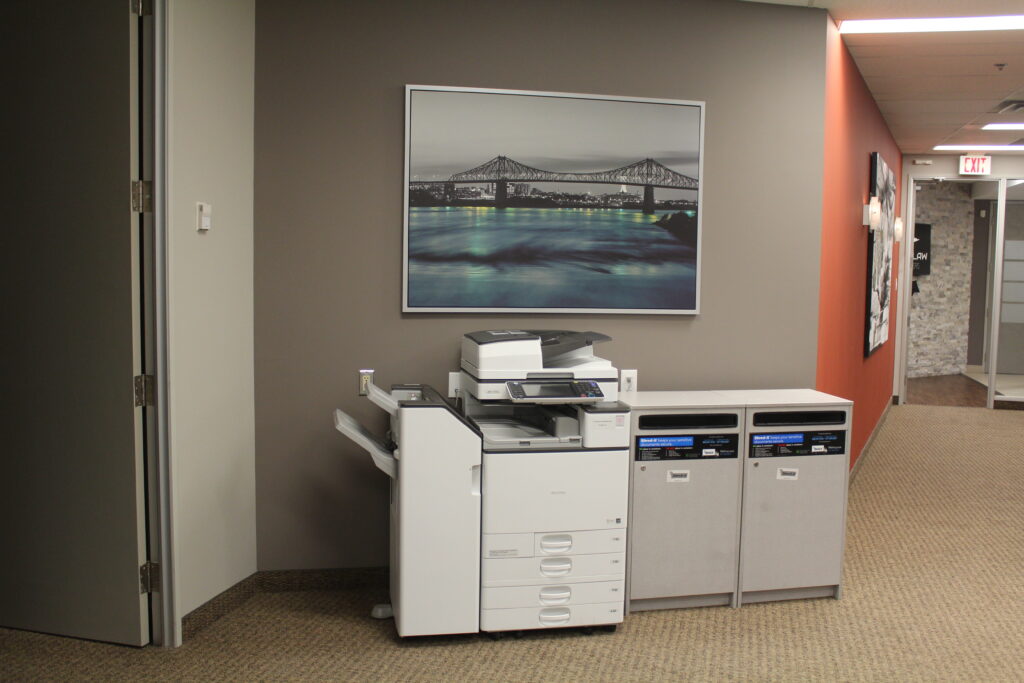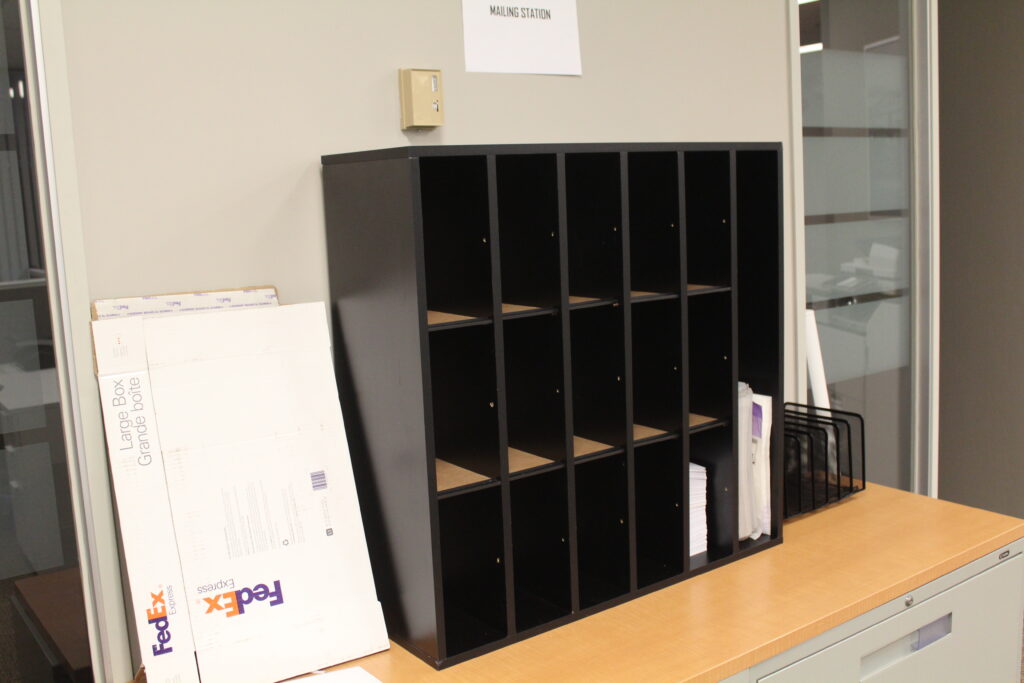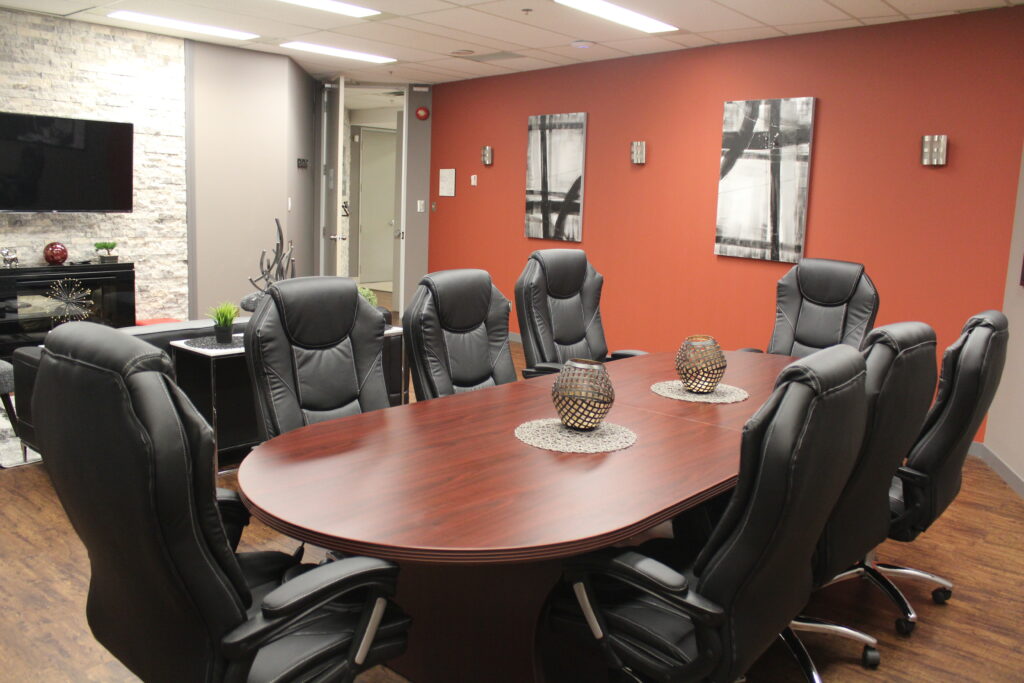PARALEGAL
We are in Toronto
We have double the reason to celebrate this Canada Day. We have found the best place to open our Law Chambers in downtown Toronto! Our third location will be opening on July 1, 2021 (Happy Canada Day!) in the Richmond-Adelaide Centre on the 29th floor. We have a beautiful view of the city and the CN Tower. Join the Wolf Law Chambers community today and revel in the stunning views of Toronto.
Wolf Law Chambers Toronto

Legal professionals in Toronto will finally have access to the industry’s leading services offering full-service office space for small and medium firms, which are also located in Mississauga and Oakville.
Wolf Law Chambers provides an elegant workspace to allow legal professionals to grow their business and network while maintaining their independence. We offer spacious and fully furnished private offices, secretarial workstations, and boardrooms, along with a full range of administrative and support services found in established law firms so that you can focus on your legal practice.
At Wolf Law Chambers you will belong to a community of legal professionals that actively share knowledge, experience and referrals; the ideal conditions to help your practice grow and succeed.
Wolf Law Chambers members are able to focus their time on what really matters: practicing law. We take care of the administrative tasks involved with running an office. From furnishing your office, to setting up the security system and maintenance, our professional team takes care of your packages, greets your clients and makes sure that you and your clients are in a safe and clean space, disinfecting the common areas regularly.
Your private office in Toronto

At Wolf Law Chambers Toronto you will find spacious offices with lots of natural light and big windows providing a stunning view from the 29th floor.
All you need to bring are your computer and files. The offices are furnished with L-shaped desks, lockable filing cabinets and chairs for you and your clients. We leave the decoration of the office up to you.
You can “hang your own shingle” and have your nameplate on your door and at reception.
You will have a private and secure internet connection, as well as printer, scanner and fax services. A shredding service will guarantee the safe disposal of your confidential documents.
At the front desk, our office coordinator greets your clients, receives and sends your packages and manages the maintenance of the office.
For your convenience, we have several services available online, including a booking app to book the boardroom and a messenger app to communicate with colleagues and the Wolf Law Chambers team.
Basically, with a private office at Wolf Law Chambers Toronto all you need to care about are your practice and clients.
You will have access to the office 24/7 including the boardroom. So you can meet your clients in our sophisticated/elegant boardroom after hours and on weekends.
Premium Virtual Office in Toronto

If you are looking to expand your practice to Toronto or work from home, the Virtual Office is a great option for you. You will have a professional address in the core of downtown Toronto where you can meet and impress your clients.
With a virtual office you are a member of the pack, so you will have access to our referral network and our social and CPD credit events. On top of that, we will help you to promote your practice with a micro-website and social media posts.
Like other members, our office coordinator will take care of your packages and clients, and not even notice that your office is not physically with us.
Remember: We want you to succeed!
Location, Access and Parking

Wolf Law Chambers Toronto can be found on the corner of Adelaide St. West and York St. in the Richmond-Adelaide Centre within the financial district, steps away from the entertainment district and deep within downtown’s vibrant business community.
Our offices can easily be reached by car, transit, bike or on foot.
Our building is easily accessed from the Don Valley Parkway and the Gardiner Expressway. There is underground parking as well as other nearby parking options, such as the parking lot at City Hall.
If you prefer to take transit, the King and St. Andrews subway stations are minutes away, and Union Station and the Go Transit services are close by as well. The Richmond-Adelaide Centre is also connected to the PATH that connects Toronto underground enabling you to avoid the wind, snow and rain.
If you prefer to take your bike, the Richmond-Adelaide Centre has underground bike racks and changing rooms on the premises.
Premises

The Richmond-Adelaide Centre is a beautiful building with many amenities such as a food court, car wash and care, a fitness centre, outdoor space, and a concierge. Anything you could think of to make working away from home easier, this building has it, including dental clinics, a pharmacy and printing services.
The Richmond-Adelaide Centre has a beautiful patio and outdoor space where you can bring your food to eat and enjoy the sun. In 2020 a large sculpture, Dreaming by Jaume Plensa, was unveiled in the courtyard by Oxford Properties. Plensa hopes the sculpture will inspire all who see it to look inward, contemplate and dream of the future.
Services

Wolf Law Chambers has many services designed to help make our members’ practices run more smoothly and to free up their time to focus on the law and their clients. Included among our many amenities we have binding services available for binding court documents, live reception services where we greet and welcome clients as well as send and receive packages. As part of our community, legal practitioners also have unique access to our referral network and readily available witnesses and commissioners.
Security

As we are lawyers ourselves, we understand the paramount importance of confidentiality and security. To that end each private office will have their own separate internet connection. All the furniture as well as the offices are equipped with locks. We have installed an internal surveillance system to maintain the security of the Chambers at all times. Confidential documents can be discarded in a locked container which will be emptied and destroyed by a certified company. Working amongst a community of legal practitioners has the added benefit of a shared understanding amongst all the members regarding the importance of confidentiality and security. There is no better or safer space to set up a law practice.
Meet Clients in a Professional and Impressive Space

Wolf Law Chambers Toronto, like our other locations, has been exquisitely designed by the interior designers at Silver Elephant. The vibrant artwork is inspiring and motivating. Canyon-inspired walls and carpets complement the sleek finishes of the furniture. Natural light beams through tall windows and even on rainy days, the view is magical. Our boardroom combines the comfort of a meeting space, accents of Earth’s natural wonders and the inspiring view of the Toronto skyline to make a space that is both functional and destined to impress your clients.
Join Wolf Law Chambers Toronto!

Wolf Law Chambers is the place to be. It will help you save money in a professional and safe environment. Be surrounded by people that understand what your profession demands and will help you avoid distractions so that you can grow your practice. The best thing is: you are not alone. Our regular social events and office activities will keep you connected, supported and help you decompress.
Don’t waste time; schedule a tour or a phone meeting with a member of our team NOW.
Click here to schedule an in-person meeting to see our beautiful facilities.
To get more information about our services, schedule a phone meeting here.
If you want to learn more about our locations click here.
We will help you grow your practice.
At Wolf Law Chambers, we’re here to help you succeed
Presentation Skills for Lawyers – Webinar Event
We would like to give a huge thank you to Max Beaumont from Potato Chip Communications for adjusting his presentation “Presentation Skills for Lawyers” to fit an online medium. Although we were not able to participate in some of the interactive exercises that were originally planned before COVID-19 arrived and online meetings became the norm, Max still made the session fun, interactive and memorable.
Everyone has experienced the nervousness that comes with giving public presentations, perhaps reminding us of that first middle school presentation that felt like a flop! Max understands this nervousness and outlines six major things to focus on to improve our presentation skills: mindset, body language, audience interaction, conversational delivery, and simple messages.
The biggest takeaway was mindset and audience interaction.

Our natural bent when explaining our presentation before our peers or others is to focus on ourselves: not messing up, slowing down our speech, getting sales, how we’re coming across. Bottom line? We’re thinking about ‘me’. Max challenged us to change our mindset, shifting it from the mechanics we’re engaging in to get our message across, to instead think about our audience, to listen to ourselves as if we were sitting in their shoes. In addition, he let us in on the ‘secret sauce,’ the key ingredient to channeling our nervousness into a presentation that achieves a conversational style and engages our audience in an accessible way. By the end, we all left the meeting with something to think about.
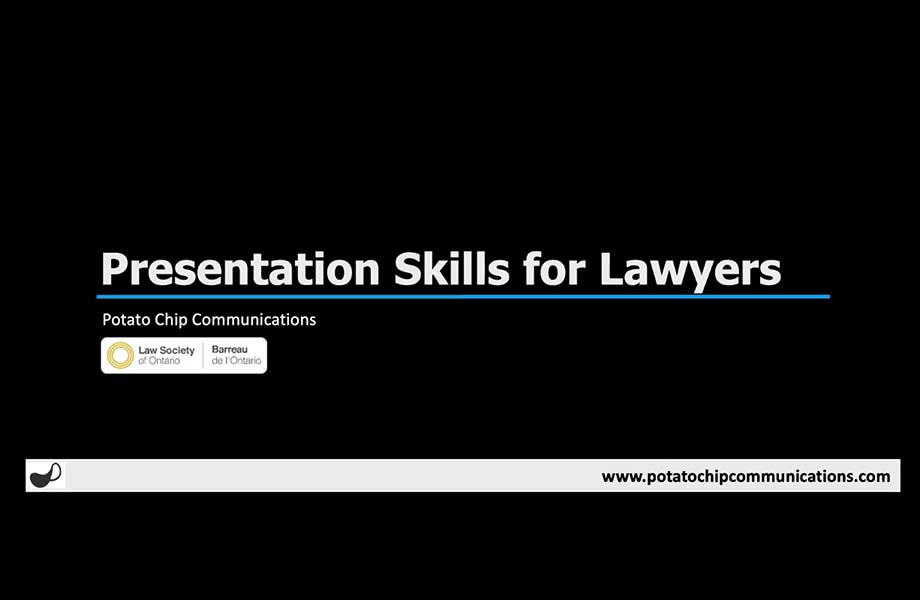
This is one of the benefits of being a member of Wolf Law Chambers, that from time to time we come together as a community of professionals to participate in ongoing educational seminars that are also open to friends of Wolf Law Chambers. And of course, the credits gained by attending count towards a legal practitioners’ annual requirement for continuing education.
We invite you to join us for our next seminar. Who knows? Maybe Max will be back.
No Detail Is Too Small: Thamar Abdu
Thamar Abdu of Thamar Bilingual Legal Services Ontario provides legal services in both French and English. After becoming a licensed paralegal in April 2018, Thamar started her practice in May 2018. She focuses on Small Claims Court matters and commercial litigation, such as a contract dispute between two businesses or between a business and an individual, as well as Landlord and Tenant issues. Her true love, though, is anything to do with contracts: going through the terms, finding the defects, examining the details.
Background
Up until three years ago, Thamar lived and worked in Quebec. She spent many years working in the financial industry before working for the government of Quebec. Both of these jobs played a role in where she has ended up today.
Her first encounter with the law as an employment opportunity was when she was asked to fill in for a colleague in the legal department of her employer’s company. To her delight, during her training she discovered an aptitude for law, understanding the concepts and aspects quite easily. As she did not have a legal education at the time, it remained a delightful discovery about herself, nothing more.
A few years later, Thamar was working for the Quebec government in a job that required her to know governmental procedure quite well and be very familiar with the law that intersected with her work. When her uncle visited from Ontario, she accompanied him to court on a minor matter, both for moral support and because she was familiar with the structure of a governmental/legal organization. Her uncle, seeing how much she enjoyed the visit to the Quebec courthouse, told her that in Ontario she could go back to school and become a licensed paralegal and provide legal services to the public.
At this point, a yearning for a new challenge had been quietly residing in the back of her mind for some time, specifically a chance to start her own business. But Thamar is not a person who works with her hands and so was not sure what her business would focus on. With no focus or outlet, the desire for her own business remained an idea. When her uncle told her about the paralegal educational opportunity, her dream came into laser sharp focus. Within a month she had resigned from her job in Quebec and enrolled in a paralegal education program in Ontario. Although it was scary and daunting to leave behind an established life as well as a secure and well-paying job, Thamar was also excited to be setting out on a new challenge, a challenge that she relished. She’s never looked back.
Puzzle Pieces
Thamar loves examining details, investigating terms, searching for information and uncovering facts. Every case is made up of thousands of tiny pieces and she enjoys putting them together to see the big picture. In another life, she might have been an investigator. As a paralegal, her passion for facts and details help her to understand each case fully. She examines every facet of a case thoroughly, looking for anything that might help or hinder her client. Although this level of detail might be daunting to some, Thamar thrives on it. She uses her drive to understand everything to her advantage, to enable her to grasp the situation a client might be facing and examine and present each possible outcome. She never underestimates the value of one detail. Although this passion for detail may cause frustration, it can also have the benefit of finding that one piece of the puzzle that changes the perspective of an entire case.
Although she is still building experience and her practice is young, she doesn’t let her newness stop or intimidate her. She throws her heart and soul into preparing for every case. All doubts and inexperience can be overcome with preparation and knowledge, she says. When asked how this translates to helping her clients, Thamar says that she is very thorough and outlines all possible outcomes that may arise. Her goal, she says, is not winning per se, but getting the best possible outcome in the circumstances for her client – be that money, an order from the judge or something else entirely.
Wolf Law Chambers
Choosing Wolf Law Chambers as the home for her practice is another decision Thamar has no regrets over. When she first started as a licensed paralegal, she worked out of a home office for a year but found it to be lonely work. She realized she needed to have other professionals around to talk about work, get opinions, brainstorm, get advice or even just to have a quick chat about coffee. Wolf Law Chambers provided this as it is a community of legal professionals. “It feels like a family,” she says. She found that her productivity soared when she was around other professionals and as an added boost, Wolf Law Chambers is more convenient for her practice. There’s a professional space readily available to meet clients, the boardroom, and if a client has problems in other areas of law, there are other legal professionals just outside her door who could help.
One of the benefits from starting her own business that Thamar enjoys is the freedom she’s gained to structure her day. As an early riser, Thamar long ago discovered her most productive hours were early in the morning. Once, those hours were needed to prep to get to the office for 9. Now that she runs her own practice, she can use those hours more effectively and efficiently because she can work from anywhere.
Although starting her own business has been challenging, Thamar focuses on the positive. She took the leap of faith to open her own business and pursue her love of law and details and contracts; what someone else may find tedious, Thamar finds fascinating.
Thamar and her eye for detail is ready to help you with your contract issues.
Learn How You Can Survive the Law Society Audit
Wow, what an amazing turnout on the eve of October 10th, 2019 at Wolf Law Chambers! We had Mark Dormer of Cosgrove give a very insightful presentation to our electric audience. It was a true success, so much so that we are hosting another in depth presentation on readying your practice for the Law Society audit in the early part of 2020. We host a variety of seminars, workshops and Continuing Professional Development (CPD) initiatives but the Law Society audit is one that touches base with all legal professionals. We have all gone through an audit by the Law Society or will be going through one in the near future. Instead of leaving things to the last moment and stressing yourself, the best approach is to ensure that you are complying with the outlined practice strategies for your area of practice from the beginning. This ensures that the proper processes for record keeping are already in place and excellent habits are developed. Thus, you will not only ‘survive’ the audit, you will thrive and excel in your legal practice.
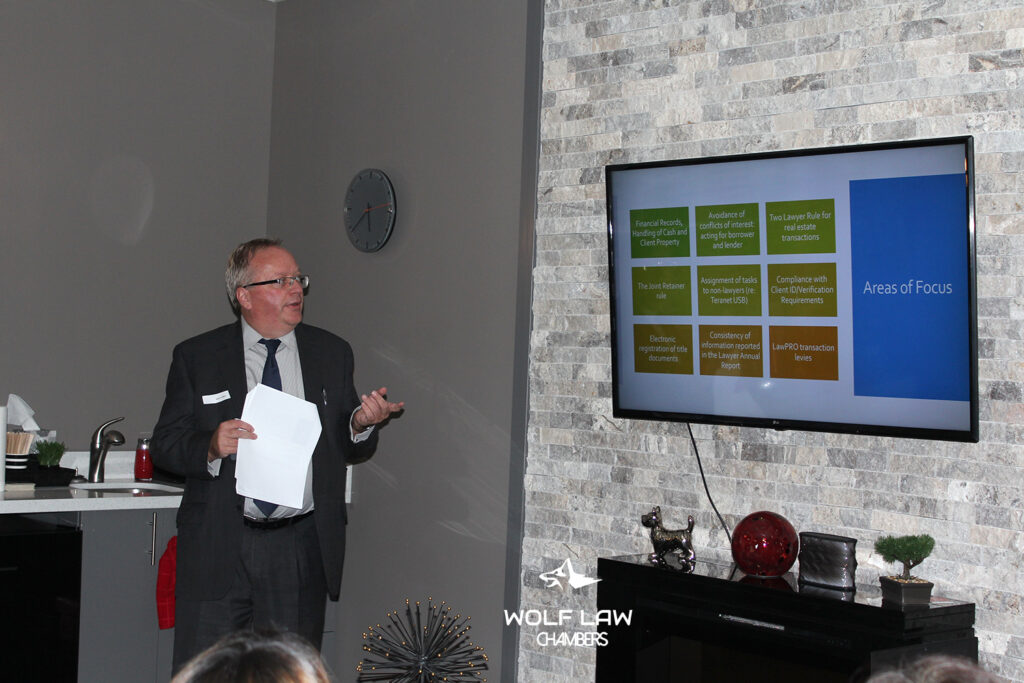
Mark Dormer, owner and president of Cosgrove, possesses grassroots knowledge of law firm management and is able to transfer is effectively to legal professionals in all areas of practice. These techniques help improve profitability and guarantee that the fear of Law Society audits is alleviated. Marks Dormer suggests that in preparation for the audit, legal professionals should:
- Develop processes for record keeping procedures that are compliant
- Maintain those systems
- Maintain up to date records
- Be proactive
Instead of panicking and scrambling things last minute, doing the above will most definitely yield the right results for you. The keys for a successful audit and practice management established by Mark Dormer are financial and client record keeping.
For financial record keeping:
- Record method of receipt for trust and general transactions (cheque, wire, etc.)
- Record method of payment for trust and general transactions
- Prepare a Form 9A for electronic transfers out of trust
- Maintain valuable property record
- Maintain cash receipts book
- Maintain Referral Fee Journal
For client record keeping:
- The client’s full name.
- The client’s business address and business telephone number, if applicable.
- If the client is an individual, the client’s home address and home telephone number.
- If the client is an organization, the organization’s incorporation or business identification number and the place of issue of its incorporation or business identification number, if applicable.
- If the client is an individual, the client’s occupation or occupations.
- If the client is an organization, other than a financial institution, public body or company that is not a private company, the general nature of the type of business or businesses or activity or activities engaged in by the client, where applicable.
- If the client is an organization, the name, position and contact information for those individuals authorized to give instructions with respect to the matter for which the licensee is retained.
- If the client is acting for or representing a third party beneficiary or a principal, information about the beneficiary or principal as applicable.
- Verification of identity when receiving, paying or transferring funds.
It is clear that a successful audit requires for a legal professional to execute proper record keeping techniques that are in compliance with the Law Society’s code of conduct. Building the right habits from the initial stages of your practice will establish processes that allow for you to manage your practice with the highest efficiency. It is very much possible that an auditor may note down a few areas of concern despite your aim for perfection but that is nothing to be worried about. The auditor is only trying to HELP YOU! Take note and consideration of their recommendations and speak openly to them about how you can improve.
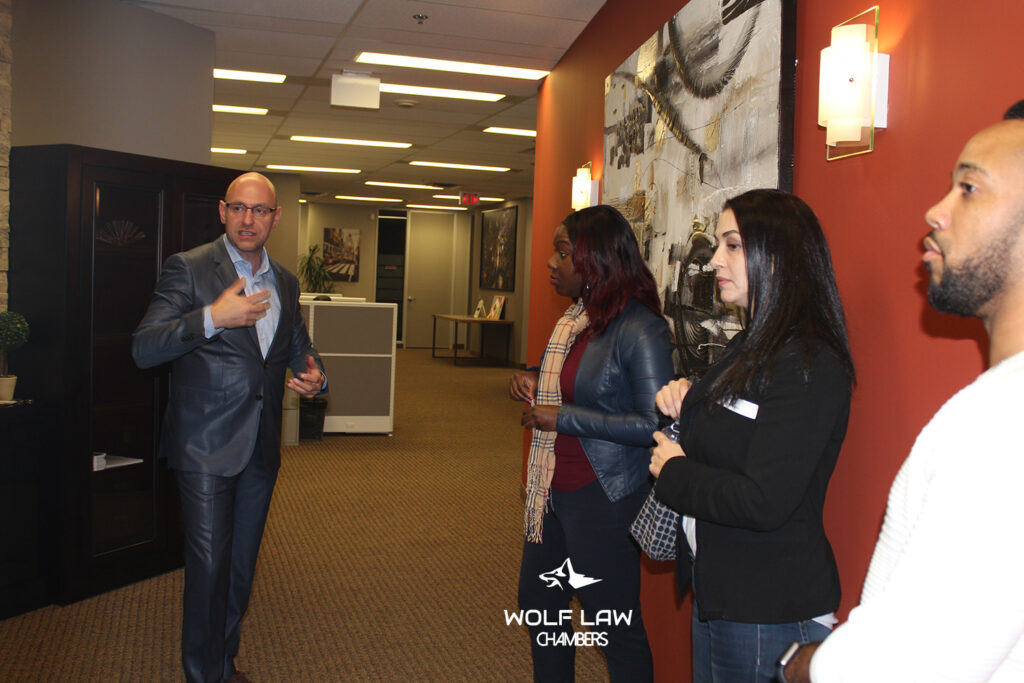
For future seminars, workshops, and Continuing Professional Development (CPD) courses, you are welcome to visit Wolf Law Chambers at 90 Matheson Blvd. W, Suite 101, in the heart of Mississauga. We aim to provide a shared workspace for legal professionals to flourish by equipping them with the tools and resources they need to succeed.
Are You Always Running Out of Time?
Are the current standards you have set in place the most efficient and viable in achieving your goals? Are you finding the right balance between your work and personal lives? Are you always pushing back deadlines and rescheduling matters? These are some of the questions you must ask yourself when assessing your legal practice. For lawyers, time is of the essence, no pun intended. They must prioritize their schedules in order to complete tasks on their daily agenda. There is always a constant influx of tasks and prioritization means everything when your most important assignment could be the next one you receive. Having the right skillset, tools, balance, flexibility, and procedures in place can simplify even the most complex matters allow lawyers to execute their plans proficiently. Such practices enable a firm to become more productive and this increased productivity is inevitably going to result in increased profits.
Let’s examine a billing trend report to determine how much billable time lawyers are actually getting out of their workday. Lawyers are working long hours to meet productivity goals but are only billing for 29% of their workday on average [1]. There is definitely a discrepancy in this figure and how occupied a typical lawyer’s schedule is. That means legal professionals are spending time carrying out tasks that do not equate to billable time. These tasks include, but are not limited to, administrative functions that are required in running your practice. Law school teaches lawyers how to carry out legal work and put their valuable legal expertise to practice. It is this knowledge and capability that allows lawyers to bill their clientele and earn an honest living. Yet, all law firms include tasks which need to be performed in order for a practice to remain functional but are not billable.

A simple business principle that can be implemented is outsourcing these tasks and leaving more time for yourself to work on assignments which can generate billable time. Bookkeeping and office administrative tasks can take up large portions of a workday but by outsourcing them to staff and paying for a particular service, more time is left for lawyers to focus on the legal matters specific to their line of work.
In realizing the proper techniques that need to be applied for running a more efficient legal practice, a quote from Mark Twain came up numerous times.
If you eat a frog first thing in the morning, the rest of your day will be wonderful.
Mark Twain [2]
and
If you have to eat a frog, don’t look at it for too long.
Mark Twain [2]
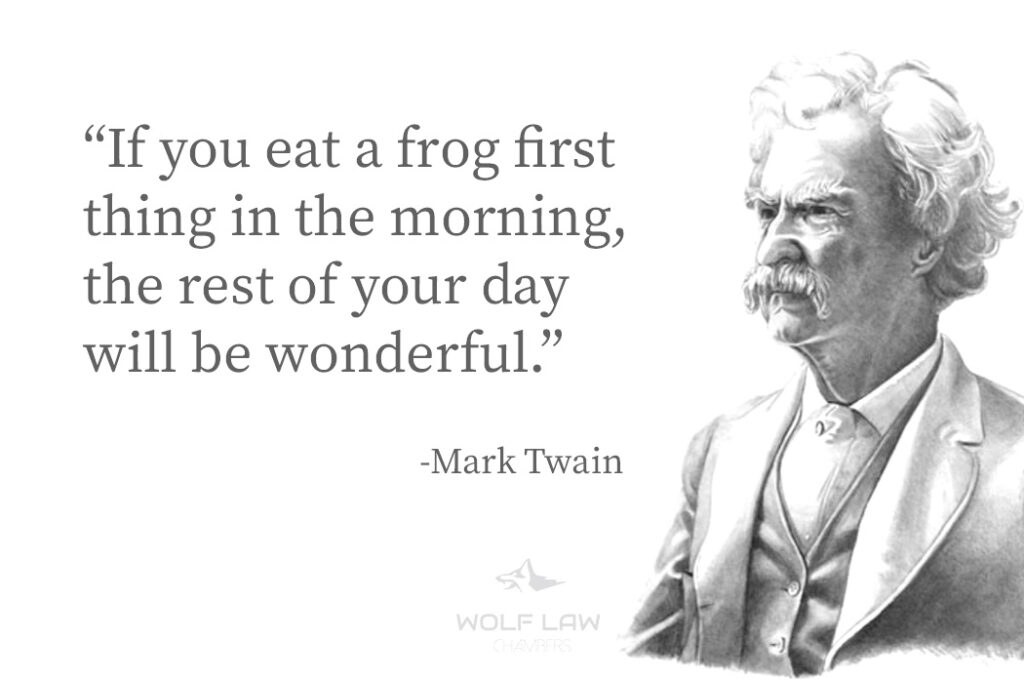
It is important to note that certain tasks can be daunting, and lawyers may push them back because they may take up most of their day. According to Twain, it is these tasks that could hold one back. Complete your most difficult assignment first thing in the morning, and suddenly, the other tasks become minute and less challenging. In doing so, you are able to prioritize your assignments, and create to-do lists for yourself in collaboration with your calendar [3].

Next, eliminating distractions will give you a sense of clarity in your work/practice. It is healthy to take breaks throughout your day and refresh but being unproductive is unjustifiable. Another healthy practice is taking care of your emotional and physical health. Being mentally and physically fit will contribute to your success just as much as your skillset and business intelligence will [4]. Being able to attract clients is not the sole determinate of success for a legal practice. It is equally important to be able to work on matters for those clients on a time efficient basis. If that includes taking a break, so be it. One should be open to the idea of stepping away from their work. Research shows that our brains are capable of solving problems while we are not actively working on them [5]. Hence, stepping away from your practice may, in fact, prove to be more beneficial than harmful.
Implementing technology may also prove to be an effective practice tool in time management. Using the most adept practice management software, communication tools, and digital services can lighten the burden on you and allow you to allocate time more freely. That simple advantage separates those attorneys who surrender focus on one aspect of their work and those who are all over the place.
A workspace committed to providing lawyers with the excellent communication tools and services to improve efficiency, is that of Wolf Law Chambers. Located in the heart of Mississauga, the chambers aids lawyers through the administrative aspects of their practice. This helps facilitate growth and expansion for the lawyers in their area of practice. Come in and see for yourself how Wolf Law Chambers is innovating time management in the practice of law. Visit us as 90 Matheson Blvd. West, Suite 101 and feel free to join us for all our upcoming events and workshops.

-Narvir Goindi
The Importance of Obtaining and Reviewing a Status Certificate with a Lawyer
It is not information itself but how we use it that defines our prudence. An overload of information will lead to poor decisions, despite any lucky benefits, since too much information is equivalent to no information, and any decision based on no information cannot be prudent but only speculative. The same can be felt by the lay potential buyer of a condominium unit who obtains a Status Certificate for determining whether to buy a unit for residence or for investment. Reviewing a Status Certificate may seem like information overload to someone who has not been trained for such a task. Thus, in such circumstances, the best approach may be to consult a lawyer who is knowledgeable of the nature and implications of the Status Certificate’s contents, for they would know how to use the information provided in the document.
Status Certificate
A Status Certificate is a document which provides potential buyers with the current legal and financial “status” of a condominium unit along with some information about the condominium corporation, which is made up of owners of the condominium. It a snapshot of the corporation and unit’s position at a given time.
A document analogous to the Status Certificate is the Annual Report of a public corporation, which contains financial statements, ongoing legal matters, and other sets of information which give potential investors a clearer picture of the business of concern. Potential investors, who are looking to be shareholders or creditors, would look to this Annual Report to gather the insights they need to make a smart investment decision. Unfortunately, not everyone knows what to look for when analyzing the Annual Report; and not everyone knows what to do despite having the necessary information in front of them.
Similar can be said to the potential buyer of a condominium unit. Upon request to the condominium corporation which owns the unit of concern, the corporation will give the requester a Status Certificate, with a specified date, containing the information listed under section 76 of the Condominium Act. The main elements of the document can be stated as follows:
- The Scope of the Unit;
- The Budget and Financial Status;
- Any Ongoing Legal Proceedings;
- Rules, Regulations, and Restrictions; and
- Insurance Requirements for owners.
Scope of the Unit
It is important for every potential buyer to consider what the unit of concern entails. Does it come with a parking unit; or perhaps a locker? The Status Certificate will confirm the legal description of the unit, including lockers or parking units. This can be important for consideration, as in some cases parking units or locker units are not owned but are instead used by the seller. Only a careful review of the Status Certificate and accompanying documents will confirm just what the seller owns and what exclusive rights are transferable to the buyer. Once confirmation is made, the potential buyer can be one step closer to being a prudent buyer.

Budget & Financial Status
The Status Certificate provides the potential buyer with the common expenses of the respective condominium unit. The document also provides any increases to the common expenses for the unit that the board has declared since the current fiscal year’s date of the budget of the corporation, along with reasons for such change, pursuant to section 76(1)(b) of the Condominium Corporation.
Moreover, while common expenses of the past are important for consideration, reviewing the current budget will also shed some light into the budgeted expenses for the condominium corporation as a whole, which provides valuable insight to the potential buyer regarding the corporation’s financial priorities for the future. It might also provide an intimation to how well the condominium corporation manages the business and its units.

In addition to the common expenses and budget, the reserve funds can provide some interesting information. In essence, it is a special account from a financial institution (i.e. bank) which is separate from the condominium’s operating fund. This special account would be used for major repairs and replacements within the condominium units. It is analogous to an emergency fund. Reviewing the reserve fund can be important for the potential buyer because, supposing the potential buyer one day becomes the new owner of the unit of concern, the answer to whether the condominium corporation can quickly repair or renovate as required may vary depending on the amount of money kept in the reserve fund. Without proper consideration of the implications of the particular amount of monies held in the reserve fund, it can be quite difficult to make a prudent purchase of the condominium, for the reserve fund analysis can be crucial when determining whether the purchase of a condominium unit was worth its price.
Legal Proceedings
The main questions regarding legal claims is quite simple: is the condominium corporation involved in any legal proceedings before the court, arbitrator, or administrative tribunal? Are there any judgments outstanding? What about liens or special assessments? Answering these questions can reveal any red flags that the potential buyer should be aware of before signing the purchase agreement. All legal questions should be pointed to answer to the ultimate question of whether the purchase of a particular condominium would be prudent. This is best achieved by consulting a lawyer.
Rules, Regulations and Restrictions
The question of whether the corporation has faced or is facing material legal problems can be followed by the question of whether there are any laws that unit owners must follow during their time of ownership. This would be very important to know before making any purchase, since such rules and regulations may constrict the intended behaviours of future unit owners. For example, a potential buyer could have purchased a condominium unit for the sole purpose of renting out the space to tenants. However, if the rules of the condominium corporation dictate that there shall be no tenants, then the purpose of the purchase is rendered meaningless, though the term against tenancy may be enforced under contract law.
Furthermore, suppose the potential owner has a pet dog. It would be quite important for the potential buyer to know the restrictions on keeping pets within the respective unit, notwithstanding whether such restriction is based on animals, breed, size or something else. Thus, a thorough review of the rules disclosed through the Status Certificate would provide the potential buyer with the information to properly determine whether their intended use for the property of concern would comply.
Insurance Requirements
Needless to say, insurance is important; and a brief review of the condominium declaration can provide clarification to the potential buyer on the insurance coverages that a current owner is required to obtain. Typically, a condominium corporation maintains comprehensive insurance for the building and its common elements. However, unit owners are often required to obtain coverage for their personal property, and for liability relating to incidents within the purchased condominium unit. Discussing these insurance requirements with an insurance agent during the conditional period will allow a prospective buyer to determine whether they will be able to obtain the required coverage and associated costs.
Concluding Remarks
Not everyone knows what to look for when analyzing the Status Certificate; and not everyone knows what to do despite having the necessary information in front of them. It is not enough to obtain and review complicated information alone, just as it is not enough for the lay reader to understand the implications of the information written in an Annual Report or a medical report. Someone reviewing an Annual Report would be prudent in seeing an expert in Accounting, Finance or Law. Someone reviewing a medical report would be prudent in consulting a doctor. Likewise, the potential buyer of a condominium unit would be prudent in reviewing the Status Certificate with an expert in the field of Real Estate Law. Thus, seeking consultation with a lawyer on the Status Certificate can be the best approach in making a well informed prudent purchase of a condominium corporation, whether it be a new home or a new investment.
-Aaron Rajesh
5 ways to effectively market yourself in a legal practice
In today’s market, competition is generally high. How we present ourselves to the world can make a significant impact on the success of our firm or practice. So here are the 5 ways to effectively market yourself in the legal market.
We made sure to keep our list simple and easy to remember:

These are the traditional five senses. It should be the goal of the effective legal firm or practice to reach all five senses of potential clients through various means.
 Vision:
Vision:
It is important for the practitioner, or any business for that matter, to reach the potential client’s line of sight. There are many ways to do this. In today’s market, however, one of the most effective means for catching the eyes of the potential client is by having a clear and simple website which is easy to use and, most importantly, is on the first page of a Google Search. Also, if it is known that a specific group of potential clients watch a particular channel on TV, try to put an advertisement on that channel. If your potential clients are likely to spend more time on YouTube, make a YouTube channel or advertisement.
But don’t just stop after that. A marketing campaign is not just outside the office but inside as well. If a potential client walks into the office, it is important that such office looks good (check out our article on the Perfect Office). Furthermore, it is important that the practitioner looks good! So make sure to dress to impress.

Reaching the client’s line of sight and gaining their attention and interest is very important, for our memory works best from visual stimuli. In other words, we are generally better at remembering or recalling what we have seen attentively rather than what we smell or touch. So make sure to reach the eyes of potential clients and show them your value.
 Hearing:
Hearing:
Human beings are generally good at remembering what they have heard if they are attentive to what they hear. So it is important for any practitioner or firm to be heard in a way that draws attention.
There are many ways to be heard. Today, podcasts are quite popular. It may be beneficial to attend someone’s podcast and speak with clarity and specificity. Another option is to place an advertisement on a radio channel if it is known that potential clients will be listening to that channel.

However, the best and most effective way to be heard is to be a good lawyer or firm. If the work you do is exceptional, it is possible that clients will speak on your behalf by placing a good review. Reputation matters a lot in this field. There is nothing better than a potential client saying, “I hear this lawyer is amazing at what he does.”
 Smell:
Smell:
In contrast, there is nothing worse than a potential client saying, “something smells fishy.” Trust is crucial to a legal practice not only from a legal standpoint but also from a business standpoint. In addition to the metaphorical sense of smell, it may also help to literally smell good.
Olfactory marketing is a relatively underdeveloped field of sensory marketing. However, there is evidence that the scent of a person may have an impact on first impressions. And if first impressions are good, then the following impressions tend to also be good. Thus, to enhance the likelihood of good impressions, make a good first impression by investing in scents which make the office smell good and make the lawyer smell good.
 Taste:
Taste:
Did someone say, “free pizza?”. It is common knowledge that our actions sometimes follow our stomachs. So to be more welcoming to potential clients or current clients, make sure to invest in some refreshments for clients entering the office. Offer them coffee or tea during meetings, give them refreshments, etc. Be hospitable. Sometimes, it could even help to take a potential client to lunch.
 Touch:
Touch:
Be careful with this channel of marketing. There are some clients who are huggers and some who are not. But nothing beats a strong and confident handshake. Since first impressions matter, and a handshake significantly affects first impressions, handshakes do matter.

But handshakes are not only important for first impressions. It can also be important when saying goodbye. Last impressions can sometimes be just as important as the first. So make sure, after speaking to a potential client, to give a good handshake when saying goodbye for the day.
Sensory Marketing (Scrap Notes)
|
(what do customers see?) |
|
|
|
|
|
|
|
|
|
|
|
|
|
What makes the perfect office?
The Sole Practitioner’s Perfect Office
Today, we will be shifting our focus from law to psychology. It is no secret that where we work can shape how we work. So it is within the best interest of all sole practitioners to consider where they work. After all, if the environment around us can influence the way we work, would it not be in the best interest to put ourselves within an environment which can influence us or our work in the best possible way? This is precisely why today’s question is on what makes the perfect office for sole practitioners.
Perfection implies the fulfillment of one’s purpose and the maximization of one’s potential. The office, on the other hand, is the place that is meant for people to conduct their business and has the potential for bolstering the conduct of business. When these two definitions are amalgamated, we may better understand the meaning of the perfect office: a workspace designated for conducting business which contributes, as much as an office possibly can, to the maximization of how well business can be conducted.
So how can the quality of business processes be improved by an office? This can be answered by asking ourselves three simple sub-questions:
- Will I enjoy going to this office?
- Will my office boost my productivity?
- Will my office enhance the customer experience?
Enjoyment
Going to work can be quite difficult and exhausting when there is no enjoyment there. The challenges are exasperated further when the person going to work is solely responsible for the current and future position of their business. This is why it can be important that people enjoy what they do. Enjoyment keeps us awake. It makes us want to go to work. One of the factors that contribute to the greater enjoyment is the perfect office.
The perfect office is an office which brings us as much enjoyment as an office possibly can. This can vary depending on the person, but general psychological findings indicate that most people enjoy going to an office with a natural look. Here is an example of an office with a natural look:
These are pictures taken from the office of Wolf Law Chambers. What makes it nice to look at? One of the best explanations for this is called “soft fascination”, which is said to elevate our moods (as well as replenish our capacity for memory and creativity).
This is not to say that every sole practitioner should strive to replicate this exact office. It is to simply show how people generally gravitate towards offices with some natural lighting, plants, and a green scenery. But even if a natural look is not possible, then there is research which suggests that even reminders of nature can play a role in putting us at ease while also making it easier to connect with others. Examples include aquariums, fireplaces, plants, wooden furniture, etc. Feel free to be creative within a natural image.
Productivity
A beautiful office is worth nothing if it hinders or fails to improve productivity. An office must contribute to at least some productivity. This is where choice can play a significant role. The sole practitioners has a choice to organize their office the way they like. Research indicates that this can contribute quite effectively towards the worker’s well-being and productivity.
The technology within the office can also contribute to productivity. The test for this could simply be to observe how quickly someone can complete their tasks when they have a fast and well-structured information technology or information systems. It is almost guaranteed that the person with greater information technology and systems will be more productive than the one who has none, given that they use it properly. If used improperly, productivity may be seriously hindered. This is why even a messy desk can result in greater productivity if it is an organized mess. It is not so much about the tidiness of an office but the organizational systems which make for greater productivity.
Customer Experience
As they always say, customers come first. This is especially true for lawyers. One of the factors which can contribute to the experience of a client is their experience at the lawyer’s office. The natural look of an office can certainly help in improving the image of the lawyer. Another factor, that is not already mentioned in the enjoyment section, is the concept of curved furniture. Research indicators that people generally prefer curved furniture over sharp furniture when all is organized well.
Final Remarks
In the end, what matters most in an office is that it is enjoyable and is conducive to higher productivity and a better customer experience. It is important to make sure that going to work can be enjoyable. Otherwise, completing tasks can become more challenging than it has to be, which can affect productivity negatively. An office can also play an important role in the customer’s experience between the moment they walk in and the moment they walk out. Thus, it might help any sole practitioner to create the place where client experience is positive.
-Aaron Rajesh


